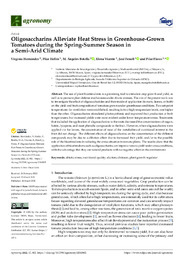Por favor, use este identificador para citar o enlazar este ítem:
https://hdl.handle.net/11000/32439Registro completo de metadatos
| Campo DC | Valor | Lengua/Idioma |
|---|---|---|
| dc.contributor.author | Hernández, Virginia | - |
| dc.contributor.author | Hellín, Pilar | - |
| dc.contributor.author | Botella, M. Ángeles | - |
| dc.contributor.author | Vicente, Elena | - |
| dc.contributor.author | Fenoll, José | - |
| dc.contributor.author | Flores, Pilar | - |
| dc.contributor.other | Departamentos de la UMH::Biología Aplicada | es_ES |
| dc.date.accessioned | 2024-07-12T08:29:03Z | - |
| dc.date.available | 2024-07-12T08:29:03Z | - |
| dc.date.created | 2022-03-26 | - |
| dc.identifier.citation | Agronomy 2022, 12, 802 | es_ES |
| dc.identifier.issn | 2073-4395 | - |
| dc.identifier.uri | https://hdl.handle.net/11000/32439 | - |
| dc.description.abstract | The use of plant biostimulants is a promising tool to stimulate crop growth and yield, as well as to promote plant defense mechanisms under abiotic stresses. The aim of the present work was to investigate the effect of oligosaccharides and their mode of application (to roots, leaves, or both) on the yield and fruit composition of tomatoes grown under greenhouse conditions. Two set-point temperatures for ventilation were established, resulting in two high-temperature levels, one higher than the other. Oligosaccharins stimulated photosynthesis and improved fruit production at both temperatures, but increased yields were more evident under lower temperature-stress. Treatments that included the application of oligosaccharins to the roots decreased the concentrations of sugars, lutein, lycopene, and most phenolic compounds in the fruit. However, when oligosaccharins were applied via the leaves, the concentration of most of the metabolites of nutritional interest in the fruit did not change. The different effects of oligosaccharins on the concentration of the different compounds may be due to a dilution effect due to increased fruit yield, and/or to the possible role of the biostimulants in reducing the stress situation in tomato plants. The results show that the application of biostimulants such as oligosaccharins can improve tomato yield under stress conditions, with the advantage that they are natural products with no negative effect on the environment. | es_ES |
| dc.format | application/pdf | es_ES |
| dc.format.extent | 14 | es_ES |
| dc.language.iso | eng | es_ES |
| dc.publisher | MDPI | es_ES |
| dc.rights | info:eu-repo/semantics/openAccess | es_ES |
| dc.rights | Attribution-NonCommercial-NoDerivatives 4.0 Internacional | * |
| dc.rights.uri | http://creativecommons.org/licenses/by-nc-nd/4.0/ | * |
| dc.subject | abiotic stress | es_ES |
| dc.subject | nutritional quality | es_ES |
| dc.subject | elicitors | es_ES |
| dc.subject | chitosan | es_ES |
| dc.subject | plant growth regulator | es_ES |
| dc.subject.other | CDU::5 - Ciencias puras y naturales::57 - Biología | es_ES |
| dc.title | Oligosaccharins Alleviate Heat Stress in Greenhouse-Grown Tomatoes during the Spring-Summer Season in a Semi-Arid Climate | es_ES |
| dc.type | info:eu-repo/semantics/article | es_ES |
| dc.relation.publisherversion | https://doi.org/10.3390/agronomy12040802 | es_ES |

Ver/Abrir:
agronomy-12-00802-v4.pdf
966,54 kB
Adobe PDF
Compartir:
 La licencia se describe como: Atribución-NonComercial-NoDerivada 4.0 Internacional.
La licencia se describe como: Atribución-NonComercial-NoDerivada 4.0 Internacional.
.png)